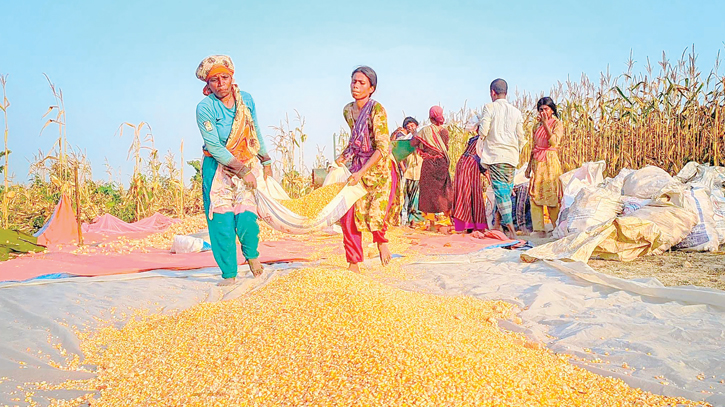
Farmers are diligently threshing maize crops in Gaibandha’s char area. Photo: Messenger
Gaibandha, located on the banks of the Teesta, Brahmaputra, and Jamuna rivers, is home to several lakhs of farmers who are facing significant challenges due to a weak marketing system and underdeveloped communication infrastructure. Despite their hard work and modernization efforts, these farmers are unable to secure fair prices for their crops, threatening their economic stability.
Agriculture is the primary livelihood for the inhabitants of Gaibandha's 165 chars (riverine islands). Once uncultivated, these vast grasslands have transformed into productive fields through modern agricultural practices. Farmers in the region now cultivate a variety of crops, including corn, pepper, sweet pumpkin, almonds, cucumbers, and sorghum. Over the past few decades, these efforts aimed to achieve economic self-sufficiency have borne fruit, yet challenges persist.
A significant issue plaguing these farmers is the lack of modern agricultural technology and government support, compounded by poor connectivity with large entrepreneurs and an underdeveloped communication system. As a result, farmers must settle for meager profits.
According to the Gaibandha Agricultural Extension Directorate, this year, 17,761 hectares of land have been cultivated in Gaibandha, with 65 percent dedicated to grazing areas. Notably, chilli cultivation covers about 1,300 hectares, with a market value of approximately 150 crore taka.
Conversations with several char farmers reveal that the marketing system for their produce is dominated by syndicates, depriving them of fair prices. During a visit to Rasulpur pasture in Phulchari Upazila, farmers were seen threshing corn under the scorching sun. While they were pleased with the yield, they were disappointed with the prices.
Farmers reported that at the beginning of the season, wheat fetched 1,400 taka per maund, but prices dropped significantly during peak season. Raw maize, for example, was sold for 800 to 900 taka. Though prices slightly increased towards the end of threshing, they remained insufficient. Currently, dry corn sells for 950 to 1,000 taka per 40 kg.
Abdur Razzak, a maize farmer, shared his experience of planting maize on six bighas of char land. He spent 15,000 taka per bigha on various inputs and expected to earn 20,000 to 25,000 taka per bigha, excluding expenses. Similarly, Rafiqul Islam from Sidhai Char lamented the diminishing profits in corn farming, citing nearly doubled costs and the inability to sell directly to buyers or entrepreneurs. Fearing further price drops, they often sell to local auctioneers at nominal profits.
An official from a private development cooperative highlighted that while the government sets prices for paddy and wheat, this is not the case for corn. Big companies dictate corn prices, making it difficult for farmers to secure fair prices. Local traders corroborated this, explaining that they adhere to prices set by major companies, leaving no room for negotiation.
Sweet pumpkin cultivation faces similar issues. Abdul Hamid, a grower from Kochkhali Char, said that local dealers buy sweet pumpkins for 15 to 30 taka per piece, while retail markets sell them by weight, leading to significant price disparities.
Chilli farmers also struggle due to a fragile transport system, which prevents them from selling green chillies promptly. Consequently, they must dry the chillies and sell them at local markets, where high broker fees and market committee charges further erode their profits.
Abdus Salam, coordinator of Friendship, an NGO working in Gaibandha, emphasized the need for better market development, government support, advanced technology, and stronger connections with large entrepreneurs. These measures, he believes, are crucial for ensuring fair prices for the hardworking farmers of Gaibandha.
Messenger/Fameema








